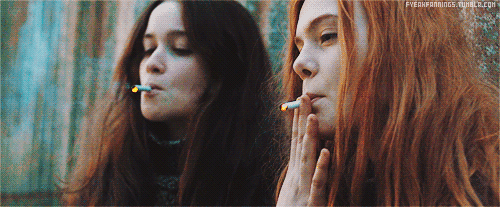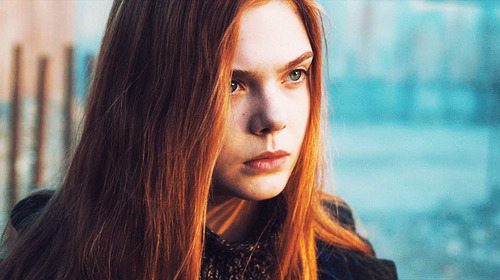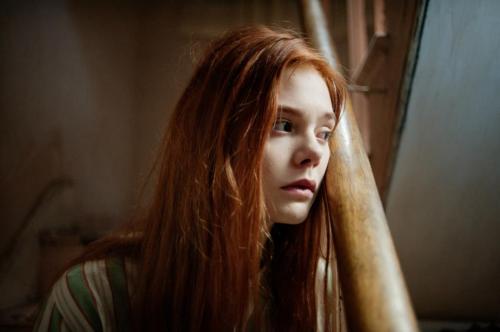London, 1962. Two teenage girls – Ginger and Rosa - are inseparable; they play truant together, discuss religion, politics and hairstyles, and dream of lives bigger than their mothers’ frustrated domesticity.
But, as the Cold War meets the sexual revolution, and the threat of nuclear holocaust escalates, the lifelong friendship of the two girls is shattered - by the clash of desire and the determination to survive.
Ginger & Rosa, directed by Sally Potter, stars Elle Fanning, Alessandro Nivola, Christina Hendricks, Timothy Spall, Jodhi May, Annette Bening and Alice Englert. The film premiered at Toronto Film Festival and was also shown at the 56th BFI London Film Festival.
Ginger and Rosa is the kind of film that leaves you completely sapped -mentally and emotionally- after watching, all in the most beautiful way. The lasting message of the film is in fact a very positive one, but delivering that message and making it stick is a painful affair.
This was my first time seeing one of Sally Potter's films, but what was immediately apparent was how well she understood the emotions and thoughts of a teenage girl. The character of Ginger was so real, from her stringy hair to her random bursts of laughter with her best friend. I have a feeling Sally Potter wrote a little of herself- at least her seventeen year-old self- into the main character. I've completely fallen for Elle Fanning as an actress- her face is just strange enough that you're completely mesmerized by all it's expressions, and she emotes so well that when she feels uncomfortable or sad or listless or frustrated, you can feel it too, twisting your stomach in every which way. The interactions between characters were given to extended bouts of silence, sometimes comfortable, sometimes because the characters didn't know what to say, but when people did speak, it felt so entirely natural. There are some scripts that feel like scripts- the characters know how to respond right away, and they know what to say. But in Potter's film, it felt like you were right there in the conversations, and the silences gave you time to think about what was being said, and if the case was, not being said.
All of the characters, supporting or main, were brought to life in the movie. No matter how much time you were given with them, you somehow were able to understand their struggles, and why they were the way they were. The way that Ginger and Rosa played off each other developed their characters that much better. I found myself identifying with Ginger so easily, but being able to understand Rosa too. Ginger seemed very childish sometimes, not in that she was necessarily immature, but just that she saw the world in such a bright and new light. She was hopeful and wanted to change things on a grand scale, philosophical in that dizzying way that only young people can be, soaking everything in. Rosa was struggling to be an adult, and only really wanted to help one person-- Ginger's dad.
The most appealing aspect of this film for me was how it approached the idea of depth in a person. It's hard to really define depth, or nail down who has it and who doesn't. It's strange, because I've always considered myself to have a measure of depth-- I read, I write, I take things in and think about them. And then I found out people who hadn't gotten to know me, or even who had, considered me to be pretty shallow. Not in a negative way, but still, it made me wonder what makes someone deep or shallow? How can we know from the self they show to the outside world? Ginger was the poet. She read, she wrote, she talked about ideas such as autonomy of thought and went to activist meetings. Rosa was the realist. She wanted to appeal to guys and spent her time reading what to do to get them to like her. She didn't really care about Ginger's causes. But while one would automatically jump to define Ginger as deep and Rosa as shallow, Sally Potter makes you wait and reconsider. It seems almost as though Ginger has all these ideas and truths that she knows about but doesn't understand, and desperately wants to understand, while at the same time her life is light, she's still a child and has the luxury of thinking of these things because she doesn't have her own problems to deal with. She protests and gets involved in these movements as a way to avoid dealing with the issues she sees around her- it's just a way to distance herself. Rosa is aware of all her own problems, and she seems to understand the things that Ginger wants to understand, but she herself doesn't want to understand them, which is why she tries to think and live on a shallower level. She wants to save Ginger's dad because she wants to save herself, and she sees herself in him. I visualize it as if she's inside a big semi-transparent orb, desperately wanting to live on the outside of it, while Ginger is on the outside trying to get in. *That doesn't make sense sorry but this is a really hard concept for me to try to explain* Really if you just watch the scene where Ginger and Rosa are in the cafe and Ginger asks if Rosa even cares about the future anymore, you'll get what Sally Potter is pointing out.
Ginger's dad is a quite clear example of Potter's focus on depth and immaturity. Roland has never let him call her Dad- he says because it sounds like a bourgeoisie trap and looks like slippers by the fire. He's been separated from Ginger's mom multiple times, and it's insinuated that he has had multiple affairs. But there's something about his attitude of free thought and autonomy and philosophy that draws you in, and you find yourself justifying him through his own reasoning. Only later in the film, when you start to see the repercussions of his lifestyle do you realize how truly immature he is. He hides this in the disguise of radical thought and the refusal to conform, but it's just how he avoids facing his own problems. Rosa's not wrong when she says he's wounded, but at a certain point you lose sympathy for him, because, well, he's a grown man and he thinks just because he's a philosopher he can hurt as many people as he wants. What I actually really appreciated was how Sally Potter addressed his relationship with Rosa. No one really berated him for how young Rosa was- the word pedophile was never said, or even inferred, because with that we have our own moral definitions and ideas of what kinds of person that is. Potter wanted the audience to see the relationship for what it was, not as a preconceived idea in our minds.
I was like "Hey, it's Joan!" when I saw the Mad Men actress playing the mother. She was so good in the role, and you felt bad for her while at the same time feeling the same frustration Ginger felt towards her- why didn't she paint anymore, why didn't she care about anything going on in the world?? It's easy for an idealistic daughter with nothing pinning her down to ask, and I myself have said the same things as Ginger to my mother countless times. Nat serves to mark the other end of the spectrum from Roland. She had to grow up too fast, and because there is so much to deal with in her own life, so many real problems, she doesn't have the luxury of being "deep".
What Potter seems to be saying through her characters is that there's a direct link between maturity and the ability to be deep and idealistic. Both sides are unhealthy, and the key is finding a balance in the middle- the right amount of mature and deep.
I loved the little support crew- Mark, Mark 2, and Bella. They were like the controls in an experiment- the calibrated ones that showed what the right balance was, so you could compare the test subjects--like Roland and Nat-- to something. I especially loved Bella's voice for some reason. It was immediately calming.
The cinematography in the movie was really beautiful at times. My favorite moments were when Elle Fanning's profile was outlined in light, and the rest of her face was dark, which was done a few times. But the lighting was so beautiful and clear throughout the movie, and the way especially the characters were shot drew out the beauty in them. The settings were all atmospheric and reminiscent of the time period- it was very believable that it was set in London in the sixties, and some places, like the father's apartment, I really wished I lived in.
Through the movie, Ginger had the habit of listening to music when she was upset, which drew attention to a wonderful soundtrack of jazz standards, with appearances from Django, Count Basie, Thelonius, and many other great names. For me, this really matched the feel of the movie. Jazz is a very atmospheric genre, but I find that it never tends to be so sad or so happy-- a lot of the time it stands apart from emotions, being more abstract and falling in the realm of thought. Having jazz was a pleasant background to the happenings in the movie, playing off them so well because they were already saturated in emotion.
Overall, the film was pretty taxing but extremely enjoyable to watch, and I know it's good because I want to keep talking about it but don't even know what to say. I think the all you really have to listen to is Ginger's poem, though.
"Despite the horror and the sorrow,
I love our world.
I want us all to live.
What really matters is to live
and if we live,
there will be nothing to forgive."





No comments:
Post a Comment